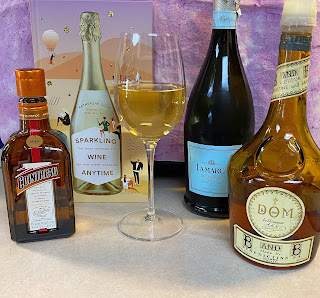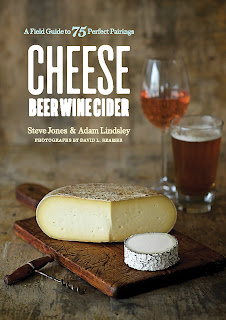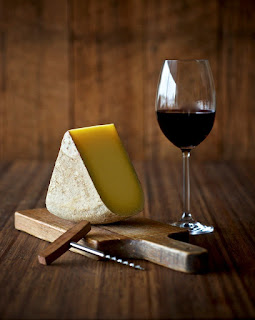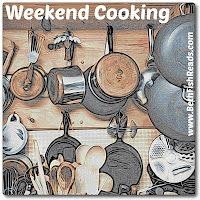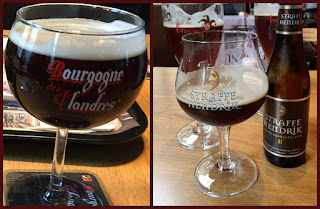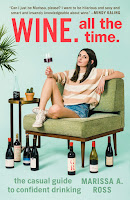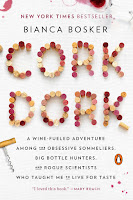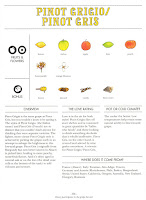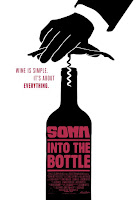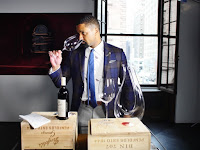6 Books for Food and Wine Lovers
Happy Saturday and Weekend Cooking day. Because it's been ridiculously hot here (as everywhere in the Northern Hemisphere), I haven't been overly motivated to cook or bake, and that has put me more than a little behind in my cookbook reviews.
Today I'm going to feature six food books that are on my radar. Three of these are for reading (or listening) and three are for cooking and baking. It may be a few weeks (or even into September) before I'll be ready to turn on the oven, but I should be able to tell you my thoughts on the foodie books before the end of summer.
Note that all these books were (or will be) published in 2022. I want to thank the publishers and publicists for the review copies. Because I haven't yet explored these books in depth, the following thoughts are based on my first impressions.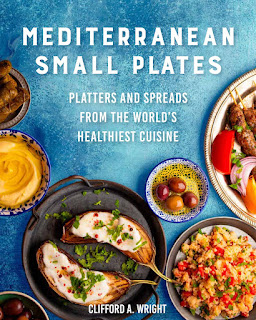 Mediterranean Small Plates by Clifford A. Wright (Harvard Common Press, August): Who doesn't love having substantial appetizers for dinner? In this cookbook, Wright takes us all the way around the Mediterranean Sea in small plates: from tapas in Spain to hors d'oeuvres in France; meze in Greece, Turkey, and the Balkans; and ending with mazza in the Mideast and North Africa. The opening chapters introduce us to the health benefits of the Mediterranean diet, how to make a balanced small-plate meal, and a list of ingredients to have on hand. The chapters explore each region separately, providing recipes, background info, tips, wine pairings, and more. The cookbook ends with almost 20 menus for small-plate meals for entertaining. Pretty much everyone will find more than a few recipes that will fit their dietary plan; I was impressed with the variety of flavors and types of dishes. Note too that many of the recipes are easy and quick enough for weeknight dinners.
Mediterranean Small Plates by Clifford A. Wright (Harvard Common Press, August): Who doesn't love having substantial appetizers for dinner? In this cookbook, Wright takes us all the way around the Mediterranean Sea in small plates: from tapas in Spain to hors d'oeuvres in France; meze in Greece, Turkey, and the Balkans; and ending with mazza in the Mideast and North Africa. The opening chapters introduce us to the health benefits of the Mediterranean diet, how to make a balanced small-plate meal, and a list of ingredients to have on hand. The chapters explore each region separately, providing recipes, background info, tips, wine pairings, and more. The cookbook ends with almost 20 menus for small-plate meals for entertaining. Pretty much everyone will find more than a few recipes that will fit their dietary plan; I was impressed with the variety of flavors and types of dishes. Note too that many of the recipes are easy and quick enough for weeknight dinners. Ultimate Food Atlas from National Geographic Kids (Hachette, June): I cannot wait to delve into this fun, colorful, and informative atlas. Each chapter focuses on a continent (the Australia chapter includes Oceania) plus there's a chapter dealing with climate change and the world food supply. Each chapter discusses a variety of topics pertaining to the continent (such as food production, festivals, and global issues) and includes descriptions and photos of regional foods. Instead of going country by country, the maps and sections home in on areas that share climatic, geographical, or ecological traits. Fun facts, recipes, activities, games, quizzes, and super graphics make the book a delight to look through and easy to read.
Ultimate Food Atlas from National Geographic Kids (Hachette, June): I cannot wait to delve into this fun, colorful, and informative atlas. Each chapter focuses on a continent (the Australia chapter includes Oceania) plus there's a chapter dealing with climate change and the world food supply. Each chapter discusses a variety of topics pertaining to the continent (such as food production, festivals, and global issues) and includes descriptions and photos of regional foods. Instead of going country by country, the maps and sections home in on areas that share climatic, geographical, or ecological traits. Fun facts, recipes, activities, games, quizzes, and super graphics make the book a delight to look through and easy to read. Bake by Paul Hollywood (Bloomsbury, July): In this cookbook, the world's favorite expert on all things baking shares his recipes for classic bakes: cakes, cookies, breads, pastries, and other desserts. I love to bake and am looking forward to the fall when I can try some of Hollywood's versions of naan bread, shortbread, brownie cheesecake, orange brioche, sausage rolls, bread pudding ... and well, just about everything! Beautiful photographs (some showing a step-by-step process) inspire me to don my apron, get out my pastry board, and start baking. While waiting for cooler temperatures, I plan to read through the cookbook and learn Hollywood's techniques and tweaks and tips for achieving my best bakes yet.
Bake by Paul Hollywood (Bloomsbury, July): In this cookbook, the world's favorite expert on all things baking shares his recipes for classic bakes: cakes, cookies, breads, pastries, and other desserts. I love to bake and am looking forward to the fall when I can try some of Hollywood's versions of naan bread, shortbread, brownie cheesecake, orange brioche, sausage rolls, bread pudding ... and well, just about everything! Beautiful photographs (some showing a step-by-step process) inspire me to don my apron, get out my pastry board, and start baking. While waiting for cooler temperatures, I plan to read through the cookbook and learn Hollywood's techniques and tweaks and tips for achieving my best bakes yet. To Fall in Love, Drink This by Alice Feiring (Scribner, August): If you don't know, Feiring is a James Beard award winner for her wine journalism. Besides books and articles, she also writes The Feiring Line newsletter about natural wine (see her website for more). The essays and short pieces in this volume work together as a memoir. Among the stories Feiring shares are ones about her observant Jewish family and childhood, about how she discovered the world of wine, about winemakers and the industry, and about the men in her life. Her focus is on wines that are free from the many additives used in most mainstream wines. She also introduces us to various wine regions around the world and suggests wines to put on your to-buy lists. I plan to savor this collection, one essay at a time.
To Fall in Love, Drink This by Alice Feiring (Scribner, August): If you don't know, Feiring is a James Beard award winner for her wine journalism. Besides books and articles, she also writes The Feiring Line newsletter about natural wine (see her website for more). The essays and short pieces in this volume work together as a memoir. Among the stories Feiring shares are ones about her observant Jewish family and childhood, about how she discovered the world of wine, about winemakers and the industry, and about the men in her life. Her focus is on wines that are free from the many additives used in most mainstream wines. She also introduces us to various wine regions around the world and suggests wines to put on your to-buy lists. I plan to savor this collection, one essay at a time. A Dish for All Seasons by Kathryn Pauline (Chronicle, August): I'm intrigued with the concept of this cookbook. Instead of dividing her recipes into four chapters (winter, spring, summer, fall), Pauline features a single dish and offers variations and transformations to fit the season. The main chapters are by meal or type of dish (breakfast, salads, sides); those chapters are organized by specific dishes. I'll illustrate the idea by focusing on one dish. Under "Mains" we find a section called "Sandwiches." Pauline describes her idea of a deli sandwich and then provides a grid for mixing and matching seasonal produce and flavors. Then she gives her best tips on how to create the "perfect" sandwich. Next she offers four recipes, one for each season. In this case, we find Shrimp Rolls, Boiled Corn, and Potatoes for summer, Falafel with Lemon Tahini Sauce and Lacto-Fermented Torshi for fall, a Meatball Sub with Caramelized Fennel for winter, and Bánh Mi for spring. Despite the examples I gave here, vegans, gluten-free eaters, and vegetarians will find plenty of recipes and seasonal combos to fit their needs. I'll likely use this cookbook before fall because I'd love to try some summer recipes while the farmer's markets are still in full swing.
A Dish for All Seasons by Kathryn Pauline (Chronicle, August): I'm intrigued with the concept of this cookbook. Instead of dividing her recipes into four chapters (winter, spring, summer, fall), Pauline features a single dish and offers variations and transformations to fit the season. The main chapters are by meal or type of dish (breakfast, salads, sides); those chapters are organized by specific dishes. I'll illustrate the idea by focusing on one dish. Under "Mains" we find a section called "Sandwiches." Pauline describes her idea of a deli sandwich and then provides a grid for mixing and matching seasonal produce and flavors. Then she gives her best tips on how to create the "perfect" sandwich. Next she offers four recipes, one for each season. In this case, we find Shrimp Rolls, Boiled Corn, and Potatoes for summer, Falafel with Lemon Tahini Sauce and Lacto-Fermented Torshi for fall, a Meatball Sub with Caramelized Fennel for winter, and Bánh Mi for spring. Despite the examples I gave here, vegans, gluten-free eaters, and vegetarians will find plenty of recipes and seasonal combos to fit their needs. I'll likely use this cookbook before fall because I'd love to try some summer recipes while the farmer's markets are still in full swing. Eat Up! by Ruby Tandoh (Vintage, July): If the name Ruby Tandoh sounds familiar to you, it may be because she was a finalist in the Great British Bake Off or because you've read some of her articles focusing on the intersection of food and society and culture at large. In this collection of essays, Tandoh focuses on issues that are near and dear to her, especially how attitudes about what we eat, what we look like, and who we are entangled and difficult to unknot. She talks about body shaming, being gay, emotional eating, and food in movies. She isn't shy to praise or condemn the foodie elite and food snobs. As I often do with essay collections, I plan to read this one piece at a time, all the while, taking Tandoh's advice to enjoy what I'm eating and ignore the naysayers. Note that she has a cookbook coming out in November.
Eat Up! by Ruby Tandoh (Vintage, July): If the name Ruby Tandoh sounds familiar to you, it may be because she was a finalist in the Great British Bake Off or because you've read some of her articles focusing on the intersection of food and society and culture at large. In this collection of essays, Tandoh focuses on issues that are near and dear to her, especially how attitudes about what we eat, what we look like, and who we are entangled and difficult to unknot. She talks about body shaming, being gay, emotional eating, and food in movies. She isn't shy to praise or condemn the foodie elite and food snobs. As I often do with essay collections, I plan to read this one piece at a time, all the while, taking Tandoh's advice to enjoy what I'm eating and ignore the naysayers. Note that she has a cookbook coming out in November.
Shared with Weekend Cooking, hosted by Marg at The Intrepid Reader (and Baker)Click for more

